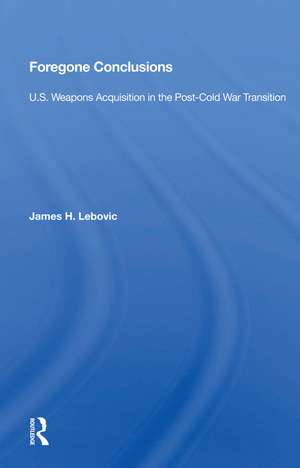Foregone Conclusions: U.S. Weapons Acquisition in the Post-Cold War Transition
Autor James H. Lebovicen Limba Engleză Hardback – 7 iun 2019
Preț: 764.20 lei
Preț vechi: 1027.40 lei
-26% Nou
Puncte Express: 1146
Preț estimativ în valută:
146.23€ • 152.99$ • 121.47£
146.23€ • 152.99$ • 121.47£
Carte tipărită la comandă
Livrare economică 03-17 aprilie
Preluare comenzi: 021 569.72.76
Specificații
ISBN-13: 9780367014926
ISBN-10: 0367014920
Pagini: 208
Dimensiuni: 156 x 234 mm
Greutate: 0.45 kg
Ediția:1
Editura: Taylor & Francis
Colecția Routledge
Locul publicării:Oxford, United Kingdom
ISBN-10: 0367014920
Pagini: 208
Dimensiuni: 156 x 234 mm
Greutate: 0.45 kg
Ediția:1
Editura: Taylor & Francis
Colecția Routledge
Locul publicării:Oxford, United Kingdom
Cuprins
U.S. Weapons Acquisition in the Post-Cold War Transition -- Perspectives on Acquisition Deficiencies -- Threat Assessment: How the Services Define Objectives -- Weapon Requirements: Whether the Services Fully Consider Objectives -- Organizational Learning: How the Services Change Objectives -- Trade-offs, Timing, and Testing: Weapon Performance in Development and Production -- Contractors, Civilians, and Congress: The Acquisition Context -- Foregoing Premature Conclusions: Opening the Acquisition Process
Descriere
With the end of the Cold War and the erosion of the Soviet threat, the United States is reevaluating its defense policy and its acquisition of weapons. James Lebovic shows that, although current military missions are adapted to post-Cold War realities, the self-defeating bias of bureaucrats and military services toward Cold War weaponry is still prevalent. He examines the impact of this bias on the armed services as they assess threat, generate requirements, develop and change weapon concepts, set production rates, and engage in testing. The author asserts that bias compromises service interests and broader military objectives and he offers general policy recommendations to put U.S. weapons acquisition on a more effective track.
